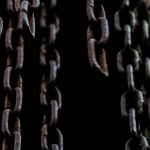They are often in tears when they arrive; driven wild by pain. As they take a seat in the waiting room, I peek through a crack in the door, noting the pale skin, the drawn expression. These are people who will do anything to feel normal again. They need me to be their saviour.
Of course, I will oblige.
As they get onto the chair, I press a button; they are soon stretched out before me. The first thing I do, is deal with the pain. You can see the relief on their faces as the numbness spreads, like an ice water wave pulsating through their veins. Taut muscles relax; the lines scarring their brows slacken. Bliss.
‘It’s been awful!’ they say, already slurring. ‘I haven’t been able to sleep.’
I soothe, but am careful not to become too familiar. I must retain my professional efficiency, because that’s what they want from me.
‘Just relax,’ I say. ‘I will sort this out for you.’
As they close their eyes, I place my hand on a forearm. My skin is warm and smooth. There must be no rough edges, no scabs or scars. These are the hands of a skilled craftsman, and those who lie back on this chair, must feel reassured that they are a safe pair.
Piano sonatas play softly in the background: repetitively melodic. Music is so important in what I do; it lowers the level of the stress hormone cortisol, calming the nerves, soothing the brain.
‘How’s that feeling now?’ I ask.
‘Mff Bddr,’ they slur. ‘Frrku.’
The woman lying here today has eyes puffy from lack of sleep; her hair is unbrushed and her mouth is dry because of the excessive amount of Codeine she’s been taking. I’m guessing it has made her constipated too, although obviously we won’t discuss that.
The Lidocaine spreads quickly, and the inner cheek is fully anaesthetised within minutes.
I get to work.
‘Just relax,’ I soothe, as her fingers claw the arms of the chair.
There is much drilling. Sprays of spittle shower her cheek and my protective glasses, before they’re sucked up by the saliva ejector wielded by my dental nurse.
Every now and then the woman yelps, when I hit an area so sensitive, that even strong anaesthetic can’t numb it. Her knuckles are white against the brown leather arm of the chair, the veins like corded rope along the backs of her hands.
‘You’re doing so well,’ I say, digging with a metal probe.
I like to think I bring creativity to this job. Obviously I’m technically skilled at what I do: I’ve had years of training, decades of experience. But it’s about more than that. These people who lie in front of me don’t have to like me – although it helps – but it’s essential they believe I’m the only one who can help them. They must be in awe of the power I wield.
I had a man in this chair last week, who has become a regular. A year ago, he had a pain in his upper right jaw, but we couldn’t track down the source. I prodded and tapped, I removed old fillings and replaced them, I even carried out an extraction. The tooth still had life left in it, but he was happy to see the back of it: convinced it was the cause of his pain. It wasn’t an easy extraction, part of the root snapped off in the gum. I got it out eventually, but there was extensive bruising.
A few days later, he was back. The dull ache was still there, keeping him awake at night. He was swallowing Paracetamol by the handful, gargling with saline, holding ice packs against the side of his face.
‘You’re unlucky,’ I told him. ‘On rare occasions, we come across a situation like this: pain for which there’s no rational explanation. But don’t worry, I’ll find out what’s going on.’
Each time he returned, we carried out more work. Sometimes he was pain-free for a couple of months; but at one stage he was back in the chair three times in a fortnight. That man has spent hundreds of pounds in pursuit of a pain-free existence. I had my front garden landscaped recently, and his frequent visits paid for most of the new decking.
As I finish up with this patient, I issue some instructions.
‘Keep the area clean,’ I say. ‘Regular flossing is essential.’
‘I hab an lectric toofbrush!’ she says, as she tries to gargle, dribbling blue liquid down her jumper.
‘Excellent!’ I say.
‘Anb I brush afta ev meal!’
‘Marvellous!’ I say, tapping on my computer, itemising the work I’ve done.
The door to the reception is open, and I can hear the invoice gliding out of the printer, where my secretary will fold it before presenting it to this relieved woman, who will pay it gladly, now she’s pain-free.
Sadly, that won’t last.
There is a little hole, just to one side of a filling, bottom left. I have drilled out the decay in the cavity and put in a shiny new amalgam. But I left that little hole, to make sure she comes back. Over the next few weeks and months, the sugar in her bad diet will eat away at that void and worm its way slowly back under the filling. The pulpy root of the tooth will start to decay again, and the pain will return.
She will yelp at the odd twinge, brush furiously and ignore it for a while. Hoping that if she does nothing, it will go away.
But teeth don’t work like that. Sooner or later she’ll be forced to come back and sit in this reclining chair of mine.
‘Oh dear,’ I will commiserate. ‘I had a feeling this tooth wasn’t going to be easy. Let’s take a look, shall we?’
Then I’ll press the button and, when she’s lying in front of me, I’ll get to work again.
…
Biography
Sarah Edghill worked as a journalist, before turning her hand to fiction. In 2015 she graduated from the Faber Academy Novel Writing course and recently won the Katie Fforde Contemporary Fiction Award for her novel Wrecking Ball, which is currently out on submission to agents. Website: sarahedghill.com Twitter: @EdghillSarah.
Image: Yingpis Kalayom





